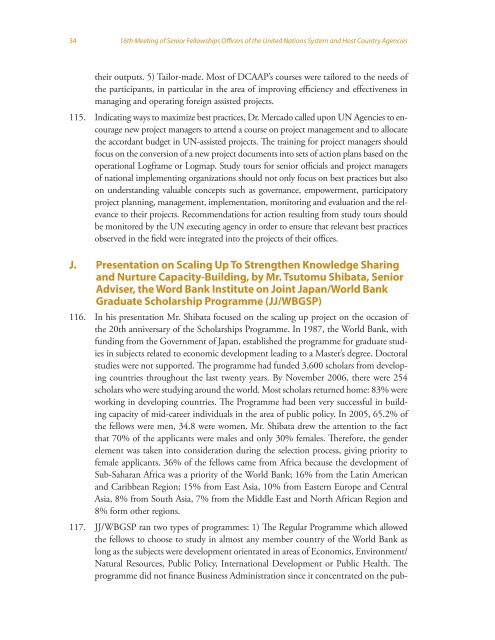16th Meeting of Senior Fellowships Officers of the ... - Development
16th Meeting of Senior Fellowships Officers of the ... - Development
16th Meeting of Senior Fellowships Officers of the ... - Development
Create successful ePaper yourself
Turn your PDF publications into a flip-book with our unique Google optimized e-Paper software.
34<br />
<strong>16th</strong> <strong>Meeting</strong> <strong>of</strong> <strong>Senior</strong> <strong>Fellowships</strong> <strong>Officers</strong> <strong>of</strong> <strong>the</strong> United Nations System and Host Country Agencies<br />
<strong>the</strong>ir outputs. 5) Tailor-made. Most <strong>of</strong> DCAAP’s courses were tailored to <strong>the</strong> needs <strong>of</strong><br />
<strong>the</strong> participants, in particular in <strong>the</strong> area <strong>of</strong> improving efficiency and effectiveness in<br />
managing and operating foreign assisted projects.<br />
115. Indicating ways to maximize best practices, Dr. Mercado called upon UN Agencies to encourage<br />
new project managers to attend a course on project management and to allocate<br />
<strong>the</strong> accordant budget in UN-assisted projects. The training for project managers should<br />
focus on <strong>the</strong> conversion <strong>of</strong> a new project documents into sets <strong>of</strong> action plans based on <strong>the</strong><br />
operational Logframe or Logmap. Study tours for senior <strong>of</strong>ficials and project managers<br />
<strong>of</strong> national implementing organizations should not only focus on best practices but also<br />
on understanding valuable concepts such as governance, empowerment, participatory<br />
project planning, management, implementation, monitoring and evaluation and <strong>the</strong> relevance<br />
to <strong>the</strong>ir projects. Recommendations for action resulting from study tours should<br />
be monitored by <strong>the</strong> UN executing agency in order to ensure that relevant best practices<br />
observed in <strong>the</strong> field were integrated into <strong>the</strong> projects <strong>of</strong> <strong>the</strong>ir <strong>of</strong>fices.<br />
J. Presentation on Scaling Up To Streng<strong>the</strong>n Knowledge Sharing<br />
and Nurture Capacity-Building, by Mr. Tsutomu Shibata, <strong>Senior</strong><br />
Adviser, <strong>the</strong> Word Bank Institute on Joint Japan/World Bank<br />
Graduate Scholarship Programme (JJ/WBGSP)<br />
116. In his presentation Mr. Shibata focused on <strong>the</strong> scaling up project on <strong>the</strong> occasion <strong>of</strong><br />
<strong>the</strong> 20th anniversary <strong>of</strong> <strong>the</strong> Scholarships Programme. In 1987, <strong>the</strong> World Bank, with<br />
funding from <strong>the</strong> Government <strong>of</strong> Japan, established <strong>the</strong> programme for graduate studies<br />
in subjects related to economic development leading to a Master’s degree. Doctoral<br />
studies were not supported. The programme had funded 3,600 scholars from developing<br />
countries throughout <strong>the</strong> last twenty years. By November 2006, <strong>the</strong>re were 254<br />
scholars who were studying around <strong>the</strong> world. Most scholars returned home: 83% were<br />
working in developing countries. The Programme had been very successful in building<br />
capacity <strong>of</strong> mid-career individuals in <strong>the</strong> area <strong>of</strong> public policy. In 2005, 65.2% <strong>of</strong><br />
<strong>the</strong> fellows were men, 34.8 were women. Mr. Shibata drew <strong>the</strong> attention to <strong>the</strong> fact<br />
that 70% <strong>of</strong> <strong>the</strong> applicants were males and only 30% females. Therefore, <strong>the</strong> gender<br />
element was taken into consideration during <strong>the</strong> selection process, giving priority to<br />
female applicants. 36% <strong>of</strong> <strong>the</strong> fellows came from Africa because <strong>the</strong> development <strong>of</strong><br />
Sub-Saharan Africa was a priority <strong>of</strong> <strong>the</strong> World Bank; 16% from <strong>the</strong> Latin American<br />
and Caribbean Region; 15% from East Asia, 10% from Eastern Europe and Central<br />
Asia, 8% from South Asia, 7% from <strong>the</strong> Middle East and North African Region and<br />
8% form o<strong>the</strong>r regions.<br />
117. JJ/WBGSP ran two types <strong>of</strong> programmes: 1) The Regular Programme which allowed<br />
<strong>the</strong> fellows to choose to study in almost any member country <strong>of</strong> <strong>the</strong> World Bank as<br />
long as <strong>the</strong> subjects were development orientated in areas <strong>of</strong> Economics, Environment/<br />
Natural Resources, Public Policy, International <strong>Development</strong> or Public Health. The<br />
programme did not finance Business Administration since it concentrated on <strong>the</strong> pub-

















